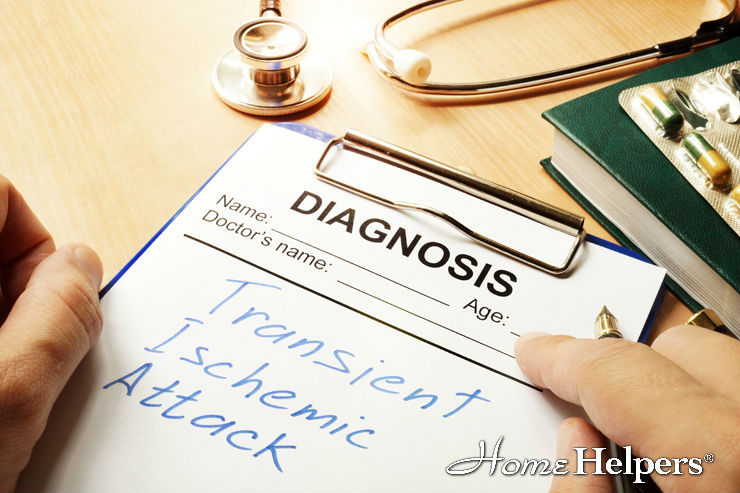Have you ever heard of a TIA? It is an abbreviation for “transient ischemic attack” that refers to having a “mini-stroke.” If the older adult in your life suddenly seems out of sorts or acts in a bizarre way, they may be experiencing a mini-stroke. They are more common than you think, and it would be very wise to know the signs and symptoms, and what to do if it happens. Let’s look deeper….
TIA Symptoms and Causes
When a stroke happens, the brain becomes seriously deprived of its blood supply. If a TIA is happening, the symptoms may only last a few minutes to an hour before dissipating. The symptoms of a TIA are pretty much the same as a major stroke but don’t last nearly as long. If your senior loved one has any symptoms at all of a stroke, you should immediately call 911 for help! Even if you’re not sure, it’s always better to be safe than sorry. Strokes are one of those episodes in which timing is everything. The sooner it is treated, the better the chances will be for a good outcome.
Symptoms to Look for:
- Weakness or numbness. This nearly always happens only on one side of the body and is a classic symptom of stroke.
- Difficulty speaking or understanding, and confusion
- Unable to see clearly out of one eye
- Dizziness
- Unable to walk without difficulty
- Balance problems
- Sense of smell or taste becomes very abnormal
A TIA is most often caused by the brain not receiving adequate blood supply. This happens when a major artery that carries blood to the brain becomes narrowed or blocked. It could also be caused when there is a blood clot somewhere else in the body and it travels to the brain, cutting off blood supply there.
One other cause could be in the brain itself. This happens when the small blood vessels in the brain become blocked, thereby reducing blood flow. It doesn’t usually last long and is caused by the build-up of plaque.
Warnings from a TIA
A TIA episode can be minor, but it is a very major warning that a serious stroke will happen soon. Nearly half of the population who has had a TIA will go on to have a full-blown stroke. These strokes most often occur within days of the TIA.
Another warning from a TIA is potential vascular dementia. This is the second type of dementia among seniors and happens due to reduced blood flow to the brain. This reduced blood flow causes one or more TIA episodes or strokes and the result over time will be vascular dementia. Because of the lack of blood flow to the brain, areas responsible for speech and understanding are severely compromised. This brings on confusion and many other classic symptoms of dementia in seniors.
What Should You Do After a TIA?
If your loved one has suffered a mini-stroke, get them to a hospital straight away. Pay close attention to the symptoms you observed and be ready to tell the doctor so they can act quickly. Once a TIA has been treated successfully, the doctor will usually put seniors on blood-thinning medication to keep blood flowing properly to the brain. This will significantly reduce the chances of a major stroke event in the future. They may also manage high blood pressure, cholesterol and heart disease with medications. In some cases, surgery is needed.
The absolute best way to help your loved one avoid a stroke is to have a healthy lifestyle. This means regular exercise, no smoking, avoiding drinking alcohol to excess, and eating a balanced diet.
If you think your senior loved one is at risk for a TIA or a stroke, please contact us today to learn more, and discuss the concerns with their doctor immediately!
Home Helpers of Eastern Idaho is a locally-owned, trusted home health care agency and offers quality, compassionate senior in-home care services including home care assistance, personal care, companion care, respite care, 24-hour live-in care, Alzheimer's & dementia care, Parkinson's care as well as homemaker services in Pocatello, Chubbuck, Blackfoot, American Falls, Soda Springs, Aberdeen, McCammon, and Lava Hot Springs, Idaho.
Legal Disclaimer
This blog provides general information and discussions about medicine, health, and related subjects. The words and other content provided in this blog, and in any linked materials, are not intended and should not be construed as medical advice. If the reader or any other person has a medical concern, he or she should consult with an appropriately-licensed physician or other healthcare workers.
Never disregard professional medical advice or delay in seeking it because of something you have read on this blog or in any linked materials. If you think you may have a medical emergency, call your doctor or 911 immediately.
The views expressed on this blog and website have no relation to those of any academic, hospital, practice or other institution with which may have been mentioned or linked to in the article.

